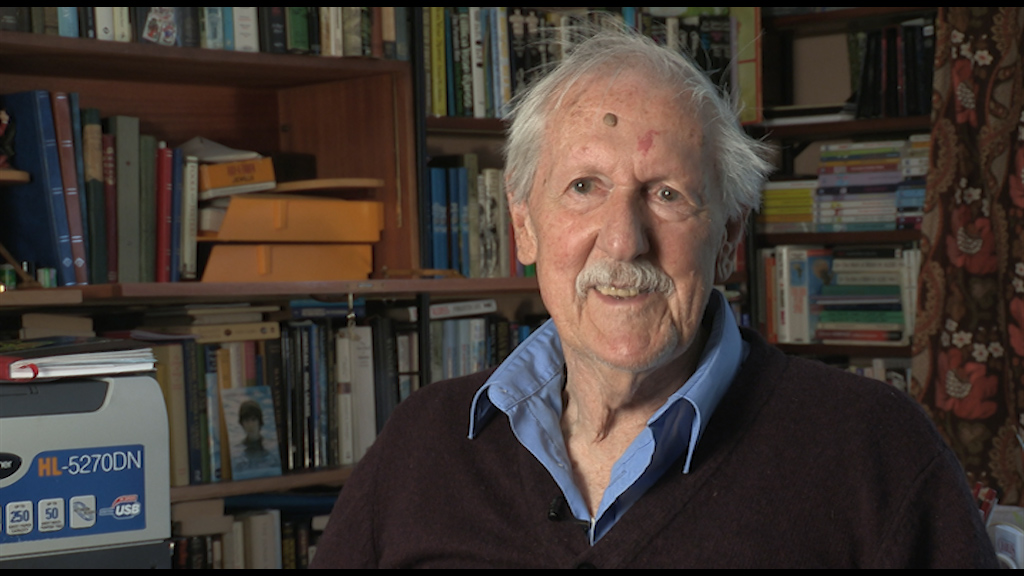NEXT STORY

The Royal Signals' lot in Burma
RELATED STORIES

NEXT STORY

The Royal Signals' lot in Burma
RELATED STORIES


|
Views | Duration | |
|---|---|---|---|
| 21. Breakfast on the move | 39 | 02:06 | |
| 22. The doorway of Burma | 45 | 02:34 | |
| 23. The Royal Signals' lot in Burma | 54 | 03:22 | |
| 24. Encountering the wildlife of Burma | 43 | 04:27 | |
| 25. Elements of culture in the midst of war | 44 | 03:37 | |
| 26. The beginning of the end of the war | 53 | 02:39 | |
| 27. A dreary homecoming | 44 | 02:14 | |
| 28. The most terrifying day of my life | 100 | 04:50 | |
| 29. The biggest tree in the world | 1 | 52 | 05:02 |
| 30. Farewell to India | 1 | 57 | 03:23 |


Eventually, we got to the very doorway of Burma.
I can't remember what happened next. I was certainly allocated to a different Signals Group, and, yes… and we were taken by lorry along a newly built road, that we knew as the Burma Road it – actually wasn't the Burma Road, but it was known as the Burma Road because no-one could think of a better name, I suppose.
And when we got to Milestone 86, we were dropped off and there we stayed... Oh God, oh yes... the accommodation was miserable, and I was put into a tent that was already occupied by infantry. Infantry, of course, has vast contempt for Royal Signals. So I had to pitch my little... what did we call it? What was the word for bed? I've forgotten – anyhow, on the edge of the tent. And in the night, I fell off the edge into the nettles, and – miserable – but, I'll say this for these bastards of infantry, they did come and pick me up and stick me back in the tent.
And, to wash in the morning, they had got... I mean, the mountain stretched up and the mountain stretched down. The mountains that stretched up carried streams, and one of the streams had been induced to go into a vast black pipe, and it spewed its water out into a pool. And so, what you had to do was to strip off and go and stand in this absolutely freezing water! Oh, God! But that was the way of keeping clean.
Brian Aldiss (1925-2017) was an English writer and anthologies editor, best known for his science fiction novels and short stories. He was educated at Framlingham College, Suffolk, and West Buckland School, Devon, and served in the Royal Signals between 1943-1947. After leaving the army, Aldiss worked as a bookseller in Oxford, an experience which provided the setting for his first book, 'The Brightfount Diaries' (1955). His first science fiction novel, 'Non-Stop', was published in 1958 while he was working as literary editor of the 'Oxford Mail'. His many prize-winning science fiction titles include 'Hothouse' (1962), which won the Hugo Award, 'The Saliva Tree' (1966), which was awarded the Nebula, and 'Helliconia Spring' (1982), which won both the British Science Fiction Association Award and the John W Campbell Memorial Award. Several of his books have been adapted for the cinema. His story, 'Supertoys Last All Summer Long', was adapted and released as the film 'AI' in 2001. His book 'Jocasta' (2005), is a reworking of Sophocles' classic Theban plays, 'Oedipus Rex' and 'Antigone'.
Title: The doorway of Burma
Listeners: Christopher Sykes
Christopher Sykes is an independent documentary producer who has made a number of films about science and scientists for BBC TV, Channel Four, and PBS.
Tags: Burma, Royal Signals
Duration: 2 minutes, 34 seconds
Date story recorded: September 2014
Date story went live: 17 August 2015